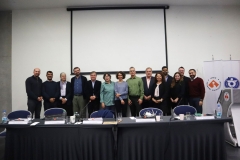
FACULTY OF BUSINESS
Department of Political Science and International Relations
PSIR 444 | Course Introduction and Application Information
| Course Name |
International Relations Through Motion Pictures
|
|
Code
|
Semester
|
Theory
(hour/week) |
Application/Lab
(hour/week) |
Local Credits
|
ECTS
|
|
PSIR 444
|
Fall/Spring
|
3
|
0
|
3
|
6
|
| Prerequisites |
None
|
|||||
| Course Language |
English
|
|||||
| Course Type |
Elective
|
|||||
| Course Level |
First Cycle
|
|||||
| Mode of Delivery | Blended | |||||
| Teaching Methods and Techniques of the Course | - | |||||
| Course Coordinator | ||||||
| Course Lecturer(s) | ||||||
| Assistant(s) | ||||||
| Course Objectives | The objective of this course is to acquaint students with the nature, structure, functioning and evolution of international system by paying tribute to international relations’ current issues, notions and challenges. The course will be using movies as a teaching tool for visualized representation of the issues at stake. |
| Learning Outcomes |
The students who succeeded in this course;
|
| Course Description | In this course, movies and documentaries that students would be expected to watch before attending lectures would be used for analyzing and debating some of the current themes of international relations. Focus of the course will be on the more visible of current issues and challenges of international relations such as terrorism, failed states, environmental problems, migration, peacekeeping, technological warfare, weapons of mass destruction and cyber threats. |
|
|
Core Courses | |
| Major Area Courses |
X
|
|
| Supportive Courses | ||
| Media and Management Skills Courses | ||
| Transferable Skill Courses |
WEEKLY SUBJECTS AND RELATED PREPARATION STUDIES
| Week | Subjects | Related Preparation |
| 1 | Introduction: Course objectives, course content, methodology and logistics. Meaning and scope of IR | Overview of the course and International relations. |
| 2 | Realist Paradigm | The Lord of the Flies (1963). Suggested reading: Cynthia Weber, “International Relations Theory, New York: Routledge, 2010, Chapter 2. |
| 3 | Liberal Paradigm | Independence Day (1996). Suggested reading: Alexander Cooley and Daniel H. Nexon, “The Illiberal Tide,” 26 March 2021. |
| 4 | United Nations, R2P, Peacekeeping | Siege of Jadotville (2016). Suggested reading: Bruce Pillbeam, “United Nations and Responsibility to Protect”, in Hough et.al., Chapter 20. |
| 5 | Environmental Issues in IR | Before the Flood (2016). Suggested reading: Joshua Busby, “Warming World,” Foreign Affairs, 14 June 2018. |
| 6 | New War and Failed States | Beasts of No Nation (2015). Suggested reading: “The world’s deadliest war last year wasn’t in Ukraine,” The Economist, 17 April 2023. |
| 7 | Human Security, Population Movements | Adu (2020). Suggested reading: Chapters 6 and 8in Christopher S. Browning, International Security – A Very Short Introduction, Oxford UP, 2013. |
| 8 | Midterm exam | |
| 9 | Technological Warfare | A Good Kill (2014) Suggested readings: Chapter-5, “The Changing Face of Conflict” in Browning, International Security; The Economist, “The war in Ukraine shows how technology I changing the battlefield”, 3 July 2023. |
| 10 | Cold War; Bipolar vs. Uni-polar vs. Multi-polar World Order | Thirteen Days (2000). Suggested reading: Stephen M. Walt, “I Knew the Cold War”, Foreign Policy, 12 March 2018. |
| 11 | Weapons of Mass Destruction | The Sum of All Fears (2002). Suggested reading: Melissa Gillis, Disarmament – A Basic Guide, 3rd ed., United Nations, pp.17-27, 39-49. |
| 12 | Terrorism | Traitor (2008). Suggested reading: Robert Malley and Jon Finer, “The Long Shadow of 9/11,” Foreign Affairs, 14 June 2018. |
| 13 | Cyber Threats | Zer0Day (2016). Suggested reading: Sydney J. Freedberg and Theresa Hitchens, “Calling SolarWinds Hack Act of War Just Makes It Worse,” Breaking Defense, 21 December 2020; Michele Flournoy and Micheal Sulmeyer, “Battlefield Internet”, Foreign Affairs, 14 August 2018. |
| 14 | Thoughts on Future of IR | Gattaca (1997). Suggested reading: Espen Barth Eide, et.al.,”10 trends for the future of warfare,” World Economic Forum, 3 November 2016; Loren Thompson, “Gene Wars,” Forbes, 29 January 2016. |
| 15 | Review of the semester | |
| 16 | Final Exam |
| Course Notes/Textbooks | There is no specific textbook. Instead, students will be expected to watch assigned movies or documentaries prior to attending lectures. A preliminary listing of assigned movies and documentaries is available under the Weekly Subjects entry. Yet, this tentative listing may be subject to modifications throughout the semester depending on movies’ availability. Therefore, students would be expected to check the course’s Blackboard entry every week for possible updates and new instructions. All assigned movies would be readily available online by gaining access to a variety of online sharing platforms (e.g. youtube, Netflix, itunes, etc.), though gaining such access may require subscription or fees, which would be the sole responsibility of students. |
| Suggested Readings/Materials | All recommended reading material would be readily available to students for downloading in the course’s Blackboard page. |
EVALUATION SYSTEM
| Semester Activities | Number | Weigthing |
| Participation |
1
|
20
|
| Laboratory / Application | ||
| Field Work | ||
| Quizzes / Studio Critiques | ||
| Portfolio | ||
| Homework / Assignments | ||
| Presentation / Jury | ||
| Project | ||
| Seminar / Workshop | ||
| Oral Exams | ||
| Midterm |
1
|
40
|
| Final Exam |
1
|
40
|
| Total |
| Weighting of Semester Activities on the Final Grade |
3
|
60
|
| Weighting of End-of-Semester Activities on the Final Grade |
1
|
40
|
| Total |
ECTS / WORKLOAD TABLE
| Semester Activities | Number | Duration (Hours) | Workload |
|---|---|---|---|
| Theoretical Course Hours (Including exam week: 16 x total hours) |
16
|
3
|
48
|
| Laboratory / Application Hours (Including exam week: '.16.' x total hours) |
16
|
0
|
|
| Study Hours Out of Class |
16
|
5
|
80
|
| Field Work |
0
|
||
| Quizzes / Studio Critiques |
0
|
||
| Portfolio |
0
|
||
| Homework / Assignments |
0
|
||
| Presentation / Jury |
0
|
||
| Project |
0
|
||
| Seminar / Workshop |
0
|
||
| Oral Exam |
0
|
||
| Midterms |
1
|
18
|
18
|
| Final Exam |
1
|
22
|
22
|
| Total |
168
|
COURSE LEARNING OUTCOMES AND PROGRAM QUALIFICATIONS RELATIONSHIP
|
#
|
Program Competencies/Outcomes |
* Contribution Level
|
||||
|
1
|
2
|
3
|
4
|
5
|
||
| 1 | To be able to use the theoretical and practical knowledge acquired in the areas of Political Science and International Relations. |
X | ||||
| 2 | To be able to have the basic knowledge of, and make use of other disciplines which contribute to the areas of Political Science and International Relations. |
X | ||||
| 3 | To be able to distinguish the differences between classical and contemporary theories and to assess their relationship. |
|||||
| 4 | To be able to recognize regional and global issues, and develop solutions based on research. |
|||||
| 5 | To be able to assess the acquired knowledge and skills in the areas of Political Science and International Relations critically. |
X | ||||
| 6 | To be able to transfer ideas and proposals on issues in the areas of Political Science and International Relations to other people and institutions verbally and in writing. |
|||||
| 7 | To be able to identify the historical continuity and changes observed in the relations between the actors and institutions of national and international politics. |
X | ||||
| 8 | To be able to examine concepts, theories, and developments with scientific methods in the areas of Political Science and International Relations. |
X | ||||
| 9 | To be able to take responsibility as an individual and as a team member. |
|||||
| 10 | To be able to act in accordance with the scientific and ethical values in studies related to Political Science and International Relations. |
|||||
| 11 | To be able to collect data in the areas of Political Science and International Relations and communicate with colleagues in a foreign language ("European Language Portfolio Global Scale", Level B1). |
|||||
| 12 | To be able to speak a second foreign at a medium level of fluency efficiently. |
|||||
| 13 | To be able to relate the knowledge accumulated throughout human history to their field of experience. |
|||||
*1 Lowest, 2 Low, 3 Average, 4 High, 5 Highest
NEWS |ALL NEWS

Sıtkı Egeli participated as a guest speaker at the HCOC Seminar
Faculty member of IUE Political Science and International Relations, Assoc. Prof. Dr. Sıtkı Egeli participated as a guest speaker at the HCOC
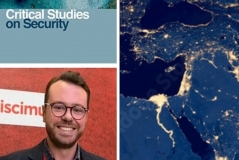
Umut Can Adısönmez's New Article Published in the Journal "Critical Studies on Security"
Faculty member of IUE Political Science and International Relations, Dr. Umut Can Adısönmez and Assoc. Prof. Laçin İdil Öztığ from Yıldız Technical
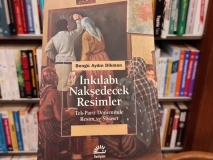
Dr. Bengü Aydın Dikmen's new book "İnkılabı Nakşedecek Resimler" is published!
Bengü Aydın Dikmen focuses on the painting policy during the foundation and construction period of the Republic. In this way, she also
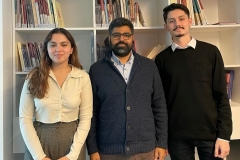
Serhun Al and Umut Can Adısönmez Lectured on Conflict Resolution and Peace Building
Faculty member of IUE Political Science and International Relations, Dr. Serhun Al and Dr. Umut Can Adısönmez, participated as trainers in the
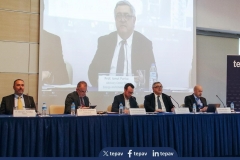
Umut Can Adısönmez participated in the "Human Security and Resilience in South East Europe" Panel
Faculty member of IUE Political Science and International Relations, Dr. Umut Can Adısönmez participated in the panel discussion "Human Security and Resilience
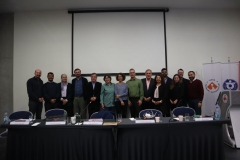
We Organized Our Republican Centennial Symposium
As the IUE Political Science and International Relations Department, we organized a symposium on the Centennial of our republic. In the symposium
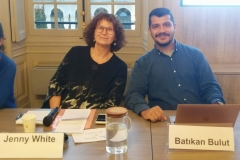
Batıkan Bulut presented his proceeding on the CEST 2023 Paris Symposium
Research assistant of the IUE Department of Political Science and International Relations, Batıkan Bulut presented his paper titled "Civil Society and Competitive



